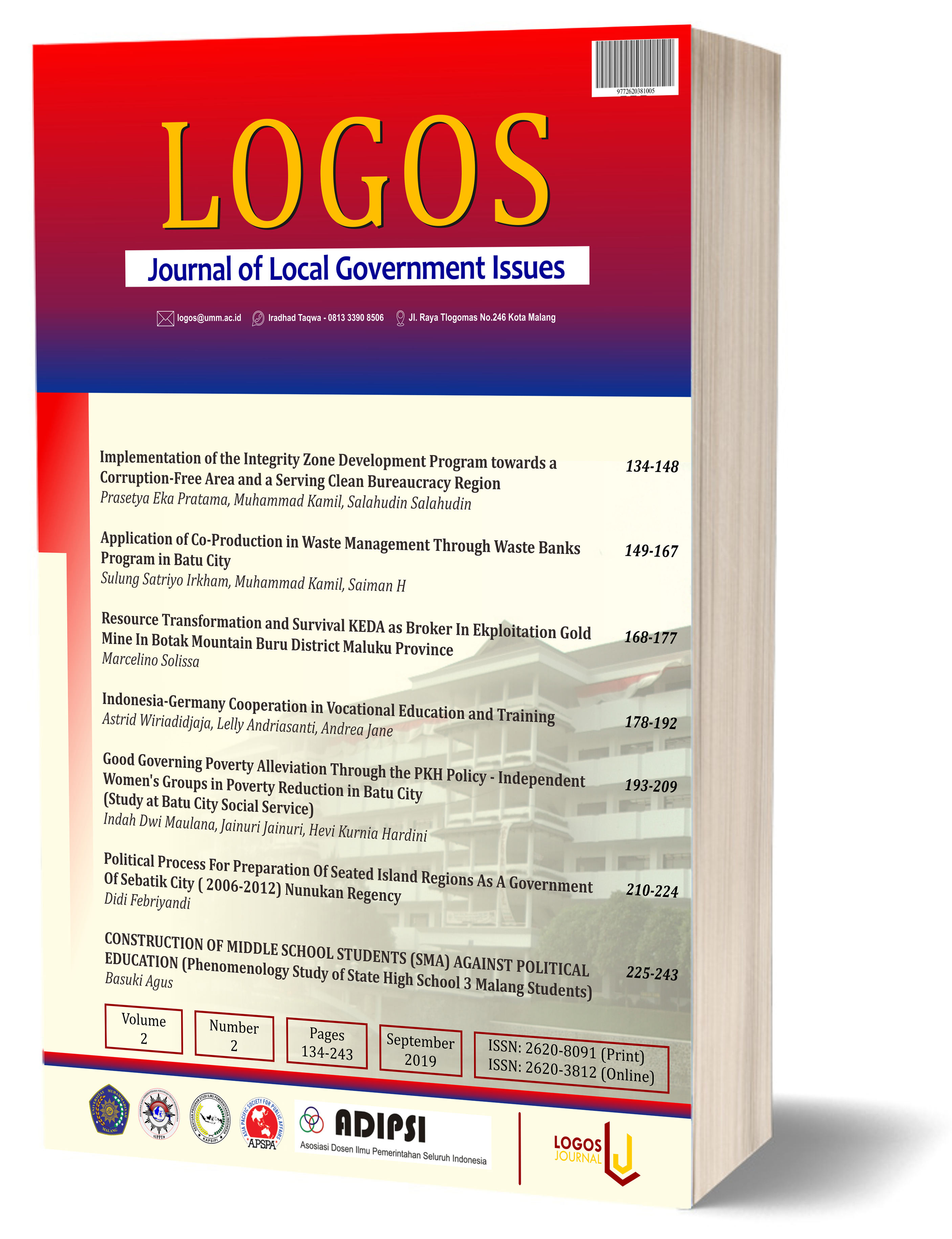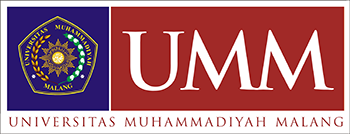Application of Co-Production in Waste Management Through Waste Banks Program in Batu City
DOI:
https://doi.org/10.22219/logos.Vol2.No2.149-167Abstract
The problem of waste in Batu City can threaten tourism sector in this city. The Waste Management System Program is held by the Environment Agency (DLH) Batu City seems to be unable to access waste problems in the upstream sector, particularly household waste from residential settlements. This lack capacity of the program followed up by DLH by organizing a waste bank program through the establishment of the Community Waste Bank (KBS) Kartini Sejati which coordinated around 60 waste banks in Batu City to be involved in waste management.This study aims to explain the involvement of KBS Kartini Sejati in waste management in co-production and the obstacles faced by it. The concept of co-production refer to an alternative concept in the implementation of public services where implementation focuses on the dominant role of the community, while the government or other parties such as the private sector are only facilitators. This research use qualitative method by utilizing data from observations, interviews and documentation. The results of this study indicate that KBS Kartini Sejati in several of its activities which include training in waste management, waste management, and "Sapu Bersih Sanpah Nyemplung Kali" (Saberpungli) have applied the principles of co-production. It is due to those activities have implemented six co-production principles, namely the development of community capacity, mutually beneficial relationships between actors, network development, the government as a facilitator and catalyst, and the community as an important asset in implementing services. However, in its implementation, the waste bank program still has several obstacles such as the limitations of the budgetary resources, the decreasing level of public awareness to be active in waste banks, and the lack of innovation in waste management
Keywords: Co-production; waste management, waste bank
Downloads
References
Asteria, D. and H. Heruman (2016). "Bank Sampah Sebagai Alternatif Strategi Pengelolaan Sampah Berbasis Masyarakat Di Tasikmalaya (Bank Sampah (Waste Banks) as an Alternative of Community-based Waste Management Strategy in Tasikmalaya)." Jurnal Manusia dan Lingkungan 23(1): 136-141.
Bachtiar, H. (2015). "Pengembangan Bank Sampah sebagai Bentuk Partisipasi Masyarakat dalam Pengelolaan Sampah (studi pada koperasi bank sampah Malang)." Jurnal Administrasi Publik 3(1): 128-133.
Farizal, F., et al. (2018). "Indonesia’s Municipal Solid Waste 3R and Waste to Energy Programs." Makara Journal of Technology 21(3): 153-159.
Jakobsen, M. and S. C. Andersen (2013). "Coproduction and Equity in Public Service Delivery." Public Administration Review 73(5): 704-713.
Melyanti, I. M. (2014). "Pola Kemitraan Pemerintah, Civil Society, dan Swasta dalam Program Bank Sampah di Pasar Baru Kota Probolinggo." Jurnal kebijakan dan manajemen publik 2(1).
Murdiningsih, R. (2015). Komisaris Independen & Independensi Komisaris, Tersedia di http://www. jiwasraya. co. id.
Needham, C. (2008). "Realising The Potential Of Co-Production: Negotiating Improvements in Public Services." Social policy and society 7(2): 221-231.
167
Please cite this article as : Sulung Satrio I.P et al., Application of Co-Production In Waste Management Through Waste Banks Program In Batu City : Journal of Local Government Issues (LOGOS), https://doi.org/10.22219/LOGOS.Vol2.No2.149-167
Ostrom, E. (1996). "Crossing the great divide: coproduction, synergy, and development." World development 24(6): 1073-1087.
Putra, F. (2012). New Public Governance, Malang: UB Press. Retrieved from http://bookstore. ub. ac. id/shop/ilmu
Safitri, Y. d. R. N. A. (2015). "Pengembangan Co-Production: Sebagai Upaya Meningkatkan Partisipasi Masyarakat dalam Peningkatan Pelayanan Publik (Best Practice Pada Pelayanan Publik di Kota Bandung)." Jurnal Wacana Kinerja 18.
Shentika, P. A. (2016). "Pengelolaan Bank Sampah di Kota Probolinggo." Jurnal Ekonomi dan Studi Pembangunan 8(1): 92-100.
Silalahi, U. (2006). Metode penelitian sosial, Unpar Press.
Sucipto, C. D. (2012). "Teknologi Pengolahan Daur Ulang Sampah." Yogyakarta: Gosyen Publishing.
Sugiyono (2011). "Metode Penelitian Pendekatan Kualitatif Kuantitatif dan R & D." Penerbit Alfhabeta Bandung.
Sukmayeti, E. and V. Y. Utami (2018). "Governansi Publik Model Co-Production Oleh Aktor Socio-Preneur (Kasus Desa Setanggor Dan Kawis Krisant)." Jurnal Ilmu Pemerintahan: Kajian Ilmu Pemerintahan dan Politik Daerah 3(2): 120-135.
Wulandari, D., et al. (2017). "Waste Bank: Waste Management Model in Improving Local Economy." International Journal of Energy Economics and Policy 7(3): 36-41.
Downloads
Published
How to Cite
Issue
Section
License
Copyright (c) 2019 Sulung Satriyo Irkham, Muhammad Kamil, Saiman H

This work is licensed under a Creative Commons Attribution-ShareAlike 4.0 International License.
Authors who publish with this journal agree to the following terms:
- Authors retain copyright and grant the journal right of first publication with the work simultaneously licensed under a Creative Commons Attribution-ShareAlike 4.0 International License. that allows others to share the work with an acknowledgment of the work's authorship and initial publication in this journal.
- Authors are able to enter into separate, additional contractual arrangements for the non-exclusive distribution of the journal's published version of the work (e.g., post it to an institutional repository or publish it in a book), with an acknowledgment of its initial publication in this journal.
- Authors are permitted and encouraged to post their work online (e.g., in institutional repositories or on their website) prior to and during the submission process, as it can lead to productive exchanges, as well as earlier and greater citation of published work (See The Effect of Open Access).

This work is licensed under a Creative Commons Attribution-ShareAlike 4.0 International License.













